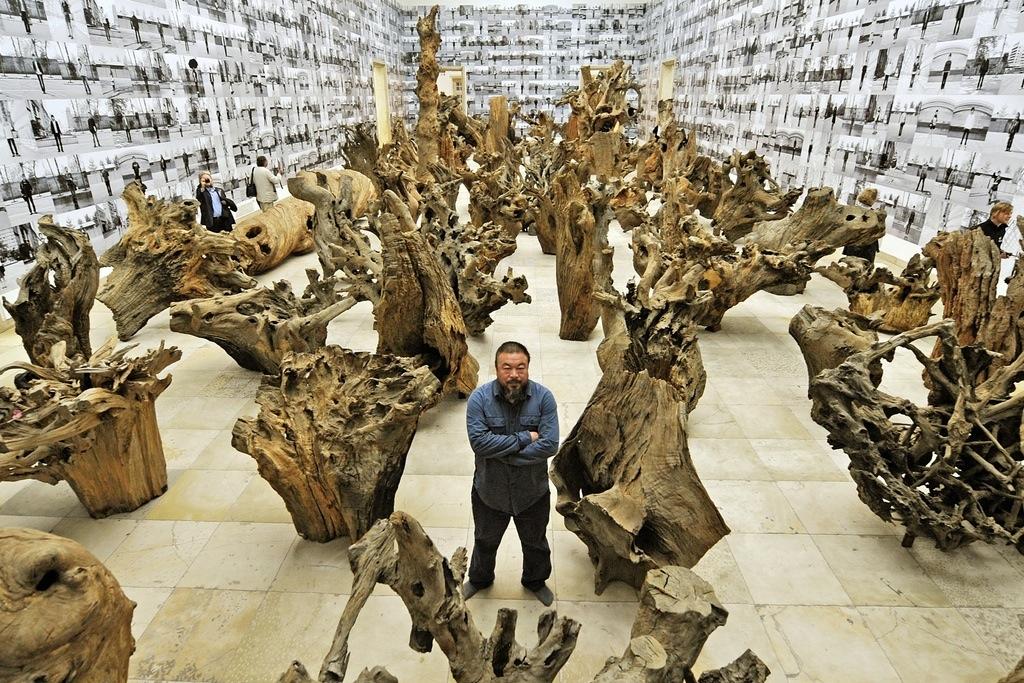China: Artists call for release of detained dissident Ai Weiwei
Chinese artist Ai Weiwei poses in the middle of his work made of 100 pieces of trees and called “Rooted Upon” at the Haus der Kunst in Munich on Oct. 9, 2009.
BEIJING, China — At an art event this weekend in Beijing’s famous factory-turned-creative district, the greatest presence in the room was the one who never showed up.
Artist Ai Weiwei was scheduled to help open a discussion of an art and design festival coming up this fall in Gwangju, South Korea. The event in the 798 district was to begin a series of discussing design and conceptualization, leading up to the Gwangju Bienalle. Ai’s picture was plastered on the wall and brochures, while two speakers used photographs of him in their presentations.
Ai, of course, has disappeared. Eight days after being nabbed by customs agents at the Beijing airport while attempting to fly to Hong Kong, his family has had no word from him and his whereabouts remain unknown.
“I cannot hide my feeling of disappointment at Ai Weiwei’s absence here,” said Seung H-Sang, Ai’s Korean co-artistic director of the event. “I hope he is safe.”
Speaker Brendan McGetrick indicated Ai was a driving force behind the event, saying, “he is very much here in spirit.”
While his absence was felt, there is no public information as to Ai’s actual whereabouts, and the government appears to have managed to silence one of its most world-famous critics. Ai, who helped design, then later distanced himself from the centerpiece of the Beijing Olympics — the Bird’s Nest national stadium — has been disappeared, in the lingo used by human rights groups and dissidents.
Ai is just one among dozens of government critics — writers, lawyers and others — who have been detained or disappeared in recent weeks amid an ongoing crackdown on dissent. His assistant, Wen Tao, a former reporter with the state-owned Global Times newspaper, is also missing.
Ai’s sister, Gao Ge, said their mother hasn’t slept properly since her son was taken. The family is concerned because by now, he will have run out of the medications he takes for chronic conditions. They fear for his safety. Even though Chinese lawyers say the family should have been notified of Ai’s whereabouts, their only, and quite limited, information has come from the media.
“We are really very upset; we worry a lot,” Gao said.
The Chinese media announced that Ai was suspected of economic crimes in a one-line item posted by the Xinhua news agency last week. The post was taken down about an hour later. Then a Chinese government spokesman on Thursday said the artist is being investigated for “economic crimes” and warned the international community from interfering in Ai’s case. Spokesman Hong Lei refused to elaborate on Ai’s location, or what exact charges he might face.
In another strange turn, a further Xinhua piece over the weekend accused Ai of copying other people’s works and making “third-rate art.”
Yet China’s warnings about outside interference has not stopped artists and governments around the world from calling for his release. Over the weekend, Lodon’s Tate Modern, where Ai recently showcased a massive work, used its own building to call for freedom for the charismatic artist.
Within Beijing, it’s difficult to gauge the potential chilling effect Ai’s arrest might have on China’s contemporary art scene. Though there are others who sell much better, Ai has always been an outspoken symbol of pushing the boundaries of art and social criticism. The Gao Brothers, a contemporary Chinese art team well-known for pressing the limits, said they are already working on a new piece about Ai.
In an email interview, the brothers said the potential for his arrest to discourage the contemporary artists is worrying.
In a letter published by the Guardian newspaper last week, dozens of aritsts, writers and others called on world leaders to press for Ai’s release, saying they fear for his safety.
“We and many Chinese and other friends are very concerned at the Chinese government's behavior towards its own citizens,” the letter said. “Ai Weiwei's position is that he firmly believes in the freedom of speech and the right to speak up on behalf of others who have been brutally silenced for their efforts to change society for the better.”
Well-known painter Chen Danqing said he doesn’t believe Ai’s arrest will cast a pall on the rest of the Chinese art world, for one primary reason: Ai is unique. Other artists don’t push the limits as he does, combining art and criticism.
“It is very simple, among all the artists here, there isn’t a second Ai Weiwei,” Chen said. “Nobody is like him. He is the only one and can’t be replaced. Can you give me another example? I don’t know one.”
Every day, reporters and producers at The World are hard at work bringing you human-centered news from across the globe. But we can’t do it without you. We need your support to ensure we can continue this work for another year.
Make a gift today, and you’ll help us unlock a matching gift of $67,000!
